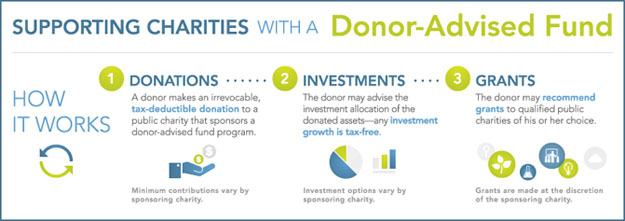Understanding DAFs
A donor-advised fund (DAF) is a centralized charitable account. It allows charitably inclined individuals, families, and businesses to make tax-deductible charitable donations of cash, publicly-traded stock, and, in some cases, certain illiquid assets, to a public charity that sponsors a DAF program.
A sponsoring organization is a 501(c)(3) public charity that sponsors a DAF program.
Additional Resources
What Is a DAF?
An Effective Way to Give
A DAF is a centralized vehicle for charitable giving that makes it easy for donors to dedicate funds to support their favorite nonprofit organization. It also provides an operationally convenient and tax-efficient method for donors to manage their charitable giving.
With a DAF, charitably inclined individuals, families, and businesses make an irrevocable gift to a public charity that sponsors a donor-advised fund program, and may take an immediate tax deduction. Donors can then recommend grants over time to eligible IRS-qualified 501(c)(3) public charities. DAFs also allow donors to approach their charitable giving thoughtfully by involving other family members or colleagues in their philanthropic decisions. Most DAFs accept donations of long-term appreciated securities and other assets, and donors can advise how the funds are invested, which could potentially allow tax-free growth, and could result in more money for your charity.

How DAF Donors Can Help Your Nonprofit Meet Its Fundraising Goals
Donor support is the lifeblood of all nonprofits. The easier you make it for donors to support your organization, the more likely it is that you will reach your fundraising goals.
In recent years, DAFs have become an increasingly popular way to manage charitable giving. Because contributions to the public charity sponsoring the DAF are irrevocable, the volume of grants coming from DAFs is relatively independent from market fluctuation and recession.

 Donor-Advised Fund FAQ
Donor-Advised Fund FAQ